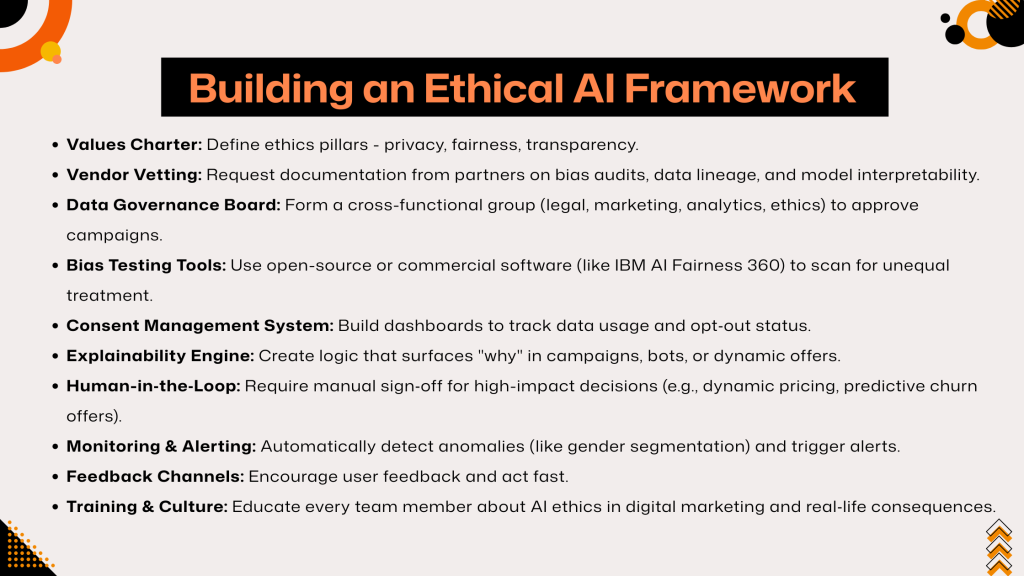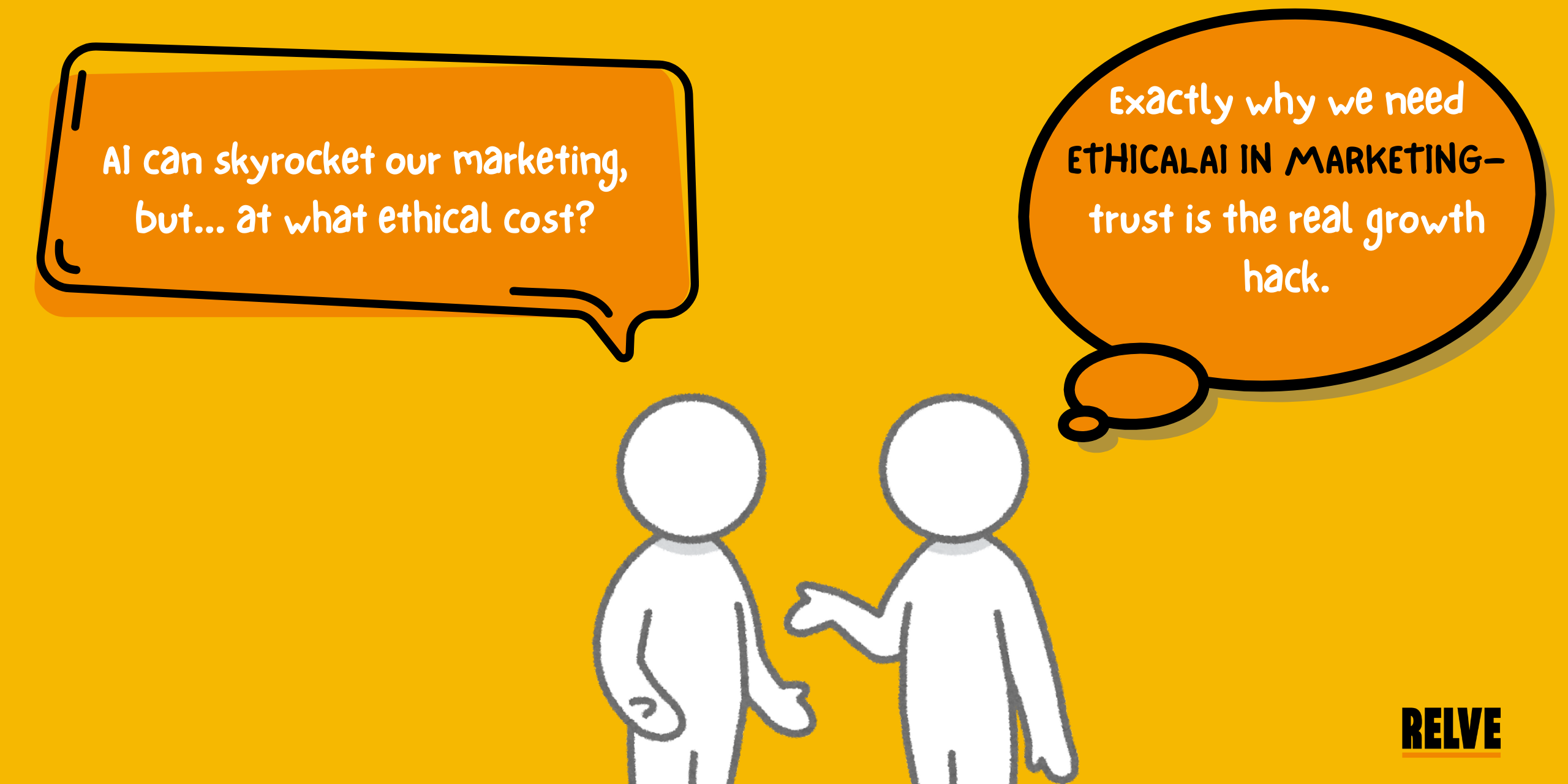Sixty percent of consumers say they would stop doing business with a company if it used AI in an unethical manner. Let’s be honest – marketing teams are obsessed with performance. Clicks, conversions, CAC, LTV – you name it. And now, thanks to AI, we can optimize, automate, and hyper-personalize like never before. But here’s the uncomfortable truth: ethical AI in marketing is often the last conversation in the room… when it should be the first. If your AI model is crushing KPIs but creeping out customers, you’re not winning – you’re losing quietly.
In this blog, we’ll unpack how to make ethical AI in marketing your strongest value driver, not your riskiest liability. From explainable personalization to bias-proof algorithms, and from consent-first data to trust-building transparency, we’ll walk through how to scale automation.
Ready to future-proof your marketing – and your reputation? Let’s get into it.
What Is Ethical AI in Marketing?
At its core, ethical AI in marketing means using artificial intelligence with transparency, fairness, accountability, and respect for privacy.
It means going beyond “does it work?” and asking “does it respect?” That includes avoiding bias, explaining AI decisions, and safeguarding data. When marketers deploy AI responsibly, they signal to customers that growth and ethics can coexist.
The Business Case for Ethics + Automation
- Trust fuels long-term loyalty: Customers are more likely to engage with brands that are honest about how they use their data.
- Regulatory resilience: GDPR, CCPA, and other frameworks are tightening; ethical processes reduce legal exposure.
- Brand differentiation: As AI becomes ubiquitous, brands that do it fairly and transparently will stand out.
- Employee confidence: Internal teams are more engaged when they know tools uphold shared values.
Core Ethical Principles for AI Marketing
Next, we will explore formative principles that guide the use of ethical AI, especially in marketing applications:
Transparency & Explainability
One of the biggest drivers of trust is making AI “explainable.” Explainable AI means demystifying: telling customers how an AI recommendation, score, or decision was made.
For example, if you use predictive scoring to identify leads, explain which factors – like engagement level or site visits – contributed to the score.
Fairness & Bias Avoidance
Machine learning on historical data risks replicating past biases. A hiring or targeting algorithm might inadvertently exclude minorities or underrepresented groups.
The ethical concerns of AI in marketing surface when automated systems reinforce prejudice or discrimination. To counteract that, conduct bias audits and balanced sampling throughout your model pipeline.
Privacy, Data Protection & Consent
Customers deserve clear information about what data is collected, how it’s used, and the freedom to opt out. This ties to ethical implications of AI in marketing, especially around behavioural profiling, micro-targeting, and influencer analytics.
Anonymize data, retain it only for necessary durations, and allow users to revoke consent on demand.
Accountability & Human Oversight
Automated systems should never serve as “unquestionable authorities.” Define who in the organization is responsible if something goes wrong and set up human fallback processes.
If an ad campaign misfires with offensive content, your team should be equipped to step in instantly.
Embedding Ethics into the Marketing AI Lifecycle
How can you integrate ethics into your AI marketing processes? Here’s how:
Strategy & Planning
Start with a values-first approach. Start by asking yourself about what ethical outcomes matter most to your brand?
Is it minimizing bias? Safeguarding privacy? Promoting transparency?
Build these values into your product requirements, vendor selection, and campaign goals.
Data Collection & Labeling
The quality of your dataset defines the fairness of your model. Train data teams to recognize skew and bias. Include diverse labelers during annotation.
This is key to ethical AI in marketing, where decisions about who qualifies for a discount, free trial, or follow-up call must be objective and fair.
Model Development & Validation
During build-out, systematically test for bias:
- Monitor predictions across gender, race, age, and geography.
- Run A/B fairness tests.
- Involve ethics councils early.
- Document all decision points.
Deployment with Ethical Guardrails
Before launch, build “ethical guardrails.” These are akin to do-or-don’t instructions to protect AI models from overstepping.
Examples for ethical guardrails include:
- No targeting sensitive attributes.
- Setting thresholds to avoid micro-segmentation, especially those that can inadvertently stigmatize people, communities, or beliefs.
- Requiring human review for “skewed” micro-campaigns.
Only deploy models that have passed ethical checks; otherwise, pause and iterate until they have.
Performance Monitoring & Feedback Loops
Post-launch, monitor not just KPIs like CTR or ROI, but also fairness metrics, opt-out rates, and customer complaints.
A good rule of thumb is to periodically survey users and ask them if they feel your business used customer data responsibly.
When something deviates from ethical standards, have clear rollback protocols in place. Enforce monthly audits or trigger them via anomaly detection.
What Is Explainable AI?
Explainable AI refers to systems that provide clear and understandable justifications for their AI decisions. In marketing, this means showing users why they got a personalized offer or score.
How to Use Explainable AI in Messaging
Here are a few examples highlighting how you used customer data ethically, primarily to offer them a better experience:
This transparency fosters trust, drives higher click-through rates, and reduces user frustration.
Ethical AI in Marketing Challenges in Practice
Let’s take a look at some real examples of how important it is to use AI responsibly for marketing purposes:
Case Study: Delta’s AI-Powered Ticket Pricing Raises Eyebrows
Delta is partnering with Israeli startup Fetcherr to deploy AI that analyses real-time customer signals – such as your search device, flight path, and browsing patterns to estimate how much you’re willing to pay for a ticket.
As of mid-2025, it’s being tested on about 3% of flights, with plans to expand to 20% of domestic routes by the end of the year.
The system identifies users who show higher willingness to pay – for example, people searching repeatedly, using more “premium” devices, or located in financially affluent areas – and adjusts prices upward accordingly. It also adjusts dynamically in response to demand, timing, weather, and other factors.
Why it’s controversial:
U.S. senators have raised ethical and privacy concerns, warning that individual “pain point” pricing could be exploitative, and they’re demanding more transparency.
Case Study: Meta’s Housing Ad Accused of Discrimination
In 2016 ProPublica demonstrated that advertisers could create housing ads that excluded users with “Ethnic Affinities” for African‑American, Hispanic, or Asian‑American individuals.
In response, HUD sued Facebook in 2019, accusing it under the Fair Housing Act of “encouraging, enabling, and causing housing discrimination” via its ad tools – such as map‑based geographic redlining and demographic exclusions.
Subsequently, a Department of Justice settlement in 2022 forced Meta to overhaul its housing ad system and remove exclusion options tied to protected characteristics.
Why it’s controversial:
This practice replicates “digital redlining”, where algorithmic ad targeting repeats historic discrimination patterns – actively preventing certain demographics from ever seeing specific housing options.
Case Study: The Kids’ Cancer Project Uses AI for Donor Engagement
The Kids’ Cancer Project, a nonprofit organization in Australia, partnered with analytics company SAS to use AI for donor engagement. Through predictive analytics, they were able to identify patterns in past donor behaviour, optimize outreach timing, and personalize messaging based on donation frequency and inferred intent.
Why it worked:
The system tracked historical giving behaviours (e.g., “donated three times in the past year”) and modelled donor profiles to predict the likelihood of engagement with campaigns. It didn’t explicitly say things like “your kids are school-aged.” Instead, it segmented audiences based on behavioural signals and likely demographic interests, helping shape outreach for campaigns like those focused on children’s education and health.
While not quoting families directly, their outreach took forms like: “You’ve supported three times already – thank you. We thought you’d care about our new research appeal to help children just like [Name].”
Results:
- 83% growth in recurring donations since implementing AI
- Annual regular giving rose to over A$2.2 million
- More effective matching of donors to cause areas they’re likely to support
Ethical Concerns of AI in Marketing Summed Up
What are the ethical considerations for using AI in marketing?
These include:
- Potential discrimination
- Raised privacy concerns
- Manipulative “dark patterns” that exploit thresholds
- Lack of transparency
- Dependency on third-party data sources with questionable ethics
As stewards of both brand reputation and consumer rights, marketers must address these issues head-on, not after public exposure or regulation.
Hover to Learn: Ethical AI Glossary
Understanding ethical AI is crucial for building trustworthy marketing strategies. Concepts like algorithmic fairness, transparency, and data privacy are the pillars of responsible innovation.
You should also consider explainability when selecting AI tools, and address bias and risk mitigation before launching campaigns powered by automation.
Building an Ethical AI Framework: A Step-by-Step Guide
Here’s a checklist to help you build an ethical AI framework that you can adopt for your organization or business:

AI Ethics in Digital Marketing: Beyond Compliance
Compliance is the floor, not the ceiling. You want to build ethical AI in marketing, not because “the law says so,” but because it reinforces identity, trust, and integrity. When a platform proudly states, “We never use sensitive attributes,” it signals commitment.
Brands that bake ethics into AI go beyond ticking boxes – they build emotional connections. That leads to superior customer lifetime value, lower churn, better word‑of‑mouth, and even better team performance behind the scenes.
Emerging Ethical Implications of AI in Marketing
As AI continues evolving, expect new ethical frontiers:
- Deepfakes & Synthetic Media: AI-generated images or voice messages can mislead customers unless clearly labeled.
- Emotion Recognition: Algorithms that detect emotions from your face/text risk privacy violations if used covertly.
- Generative Chatbots: If chatbots mimic humans too well, customers may feel deceived—always disclose “I’m a bot.”
By proactively addressing these, your brand positions itself as a future-proof leader.
Forming an Ethical AI Culture: Tips for Marketers
Here’s a few things you can do to forge ahead with ethics:
Internal Training Programs
Run monthly or quarterly workshops on topics like bias, privacy, and explainability. Include real-case red flags.
Appoint Ethics Champions
Assign marketing and AI team leads to be “ethics champions” – responsible for vetting new campaigns and tools.
Transparency Reports
Consider publishing an annual “AI Ethics Report” that outlines use cases, safeguards, and future goals.
Open Customer Dialogue
Host webinars or town halls where users can ask how their data is used, with real-time Q&A.
Are You Practicing Ethical AI?
Take this quick quiz to assess your approach to ethical AI in marketing.
Conclusion: Make Ethical AI in Marketing Your Differentiator
In the rush to scale, brands should use AI in marketing smartly and wisely. When you embrace ethical AI in marketing, you affirm that your brand prioritizes growth, not just speed. You build trust, resilience, and a future-fit reputation.
To recap:
- Align AI with core values.
- Embed transparency, fairness, and human oversight.
- Leverage explainable AI as a trust tool.
- Monitor performance and ethical outcomes.
- Stay ahead of emerging risks.
Design your AI marketing processes with ethics at their core – and watch trust become your strongest engine for growth.
